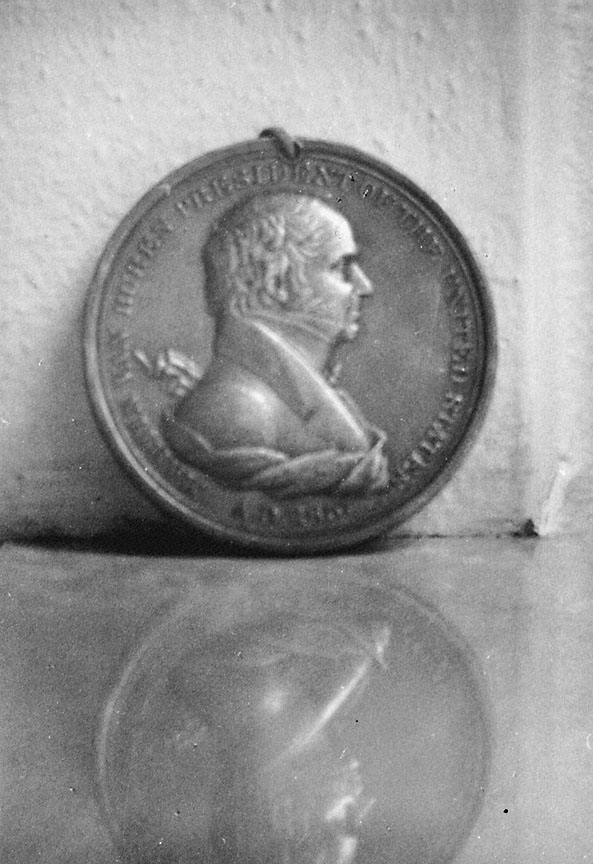- Catalog No. —
- OrHi 51007
- Date —
- c. 1845
- Era —
- 1792-1845 (Early Exploration, Fur Trade, Missionaries, and Settlement), 1846-1880 (Treaties, Civil War, and Immigration)
- Themes —
- Environment and Natural Resources, Exploration and Explorers, Native Americans
- Credits —
- Oregon Historical Society
- Regions —
- Central Southwest
- Author —
- Unknown
Medal Given to Billy Chinook
John C. Frémont gave this medal to Billy Chinook in recognition of his service to Frémont’s surveying expeditions.
Chinook, a Wasco Indian, joined Frémont’s second expedition (1843-1844) at The Dalles in 1843. At the time, Chinook was nineteen and an orphan who had lived for some time at Wascopam Mission, the Methodist establishment at The Dalles. According to Frémont, Chinook joined the surveying party because he was eager to learn more about Americans and their culture. After leaving The Dalles, the Frémont expedition explored central Oregon and the Klamath Basin before moving on to California. Upon his return to the United States in 1844, Frémont took Billy Chinook with him to Washington, D.C. From there Chinook traveled to Philadelphia, where he lived with the Quaker family of Dr. Caspar Wistar, improved his spoken English, and learned to read and write. When Frémont departed for his third expedition to the Far West, Billy Chinook accompanied him. He left Frémont’s employ in June 1847 while in northern California. Chinook spent the next few years in California, marrying a local Hispanic woman, and acquiring a large herd of California cattle. By 1851 he had returned to his native village at The Dalles and settled on Mill Creek.
Benefiting from the American education he received in Philadelphia, Billy Chinook became an important advocate for his people. In 1853, he sent a letter to Joel Palmer, Superintendent of Indian Affairs for Oregon, asking him to protect Native claims at The Dalles from encroachment by Euro American settlers. He later represented the Wasco Indians at treaty negotiations in 1855 between the U.S. government and the future residents of the Warms Springs Reservation. Chinook soon lost his claim at Mill Creek and was removed to the Warm Springs Reservation. He then worked as an interpreter on the reservation. During the late 1860s, Chinook served in the Warms Springs Indian Scout unit under the command of Captain John Darragh. Billy Chinook, also known as William Parker, died in 1890. Lake Billy Chinook on the Deschutes River, created in 1964 with the construction of the Round Butte Dam, is named for this celebrated Native leader.
Further Reading:
Clark, Keith and Donna Clark. “William McKay’s Journal: 1866-67: Indian Scouts, Part I.” Oregon Historical Quarterly 79, 1978: 156-157.
Written by Melinda Jette, © Oregon Historical Society, 2004.
